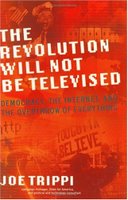 Joe Trippi is so liberal he gives Kennedy the creeps, so megalomaniacal he makes Bono seem sheepish, and so right about the internet he makes everyone still relying on top down marketing and leadership look like neanderthals. Often self-absorbed, Trippi seems to truly believe his readers shelled out $26.95 to read about his long history of political involvement ranging from student body elections in college to managing the Howard Dean campaign. I did not.
Joe Trippi is so liberal he gives Kennedy the creeps, so megalomaniacal he makes Bono seem sheepish, and so right about the internet he makes everyone still relying on top down marketing and leadership look like neanderthals. Often self-absorbed, Trippi seems to truly believe his readers shelled out $26.95 to read about his long history of political involvement ranging from student body elections in college to managing the Howard Dean campaign. I did not.
For that reason I found reading the first two thirds of The Revolution Will Not Be Televised to be like mowing a redneck’s yard in search of a buried pickup rumored to be hidden somewhere between the pink flamingos and the collection of yard gnomes.
It was there. I found a Buick sized portion of inspiration and ideas that made even the drudgery of whacking through his self-congratulatory moments and rants about conservatives worth it.
The book is divided into three parts. Part one: Life before Howard Dean – TV and big money controls politics. Part two: The ascent of Howard Dean and the rise of the common man, the internet and small donations in politics. Part Three: The collapse of Howard Dean and what we all can learn about technology based leadership, community and marketing from the candidacy of Howard Dean.
Like I said there are many finds in the weeds here. A few are:
ON THE EVILS OF TELEVISION:
“As I’ve said, TV is a passive, top-down medium. Sitting around watching television inspires nothing but more sitting around and watching more television. As Robert Putnam writes in Bowling Alone, ‘television watching and especially dependence upon television for entertainment are closely correlated with civic disengagement,’ People who call TV their ‘primary form of entertainment’ are far less likely to go to church, to write letters, to join clubs and organizations, or to attend public meetings. One estimate is that every hour of television watching translates to a ten percent drop in civic involvement.” (He’s quoting Bowling Alone: The Collapse and Revival of American Community by Robert D. Putnam)
ON THE CHARACTERISTICS OF INTERNET ACTIVISTS:
“Internet activists generally share a few common traits: They tend to be younger, they tend to be unafraid of change – in fact they demand it – and they tend to distrust the mass media to express their particular viewpoint. And so whether it’s the Drudge Report or Daily Kos, the most successful web sites and blogs on the Net have about them the unruly whiff of rebellion.”
ON BUYING THE PRESIDENCY:
The secret to Bush’s fundraising is bundling, finding those corporate donors who can hit up their employees and country club friends for $1000 and $2000 checks. The Bush team calls people who could bring in $100,000 Pioneers. Donors who bring in $200,000 in bundled checks are called Rangers. …between 1998 and May of 2003 Bush raised $296.3 million and at least a third of the total – many sources believe more than half – was raised by 631 people. …bundlers get “credit” for their fund-raising work. …So what do the Kenny Boy Lays [Trippi claims Lay brought in $600,000 for Bush] of the world get for their money? …two of the five people named to the Federal Energy Regulatory Commission had been recommended by Lay. In effect…he got to choose 40% of the government agency that would regulate his industry and his corrupt company! (Trippi gives sources for this information in the book if you’re interested)
 Trippi’s main point is that success in the industry he cares most about, politics, is up for sale to the highest bidder. He claims that the candidate with the most cash always wins. This is so, he says, because TV, before Dean’s internet campaign, was the best way to make an impression. And those TV ads cost money – lots of money. Combine this fact with the suggestion that rich white guys buy influence with the President’s party and you get the picture: Presidents are bought and not elected. Democracy is an illusion in America. Shocker.
Trippi’s main point is that success in the industry he cares most about, politics, is up for sale to the highest bidder. He claims that the candidate with the most cash always wins. This is so, he says, because TV, before Dean’s internet campaign, was the best way to make an impression. And those TV ads cost money – lots of money. Combine this fact with the suggestion that rich white guys buy influence with the President’s party and you get the picture: Presidents are bought and not elected. Democracy is an illusion in America. Shocker.
Enter Trippi, a seasoned pol and a longtime geek with a history of dabbling in upstart tech companies. He sought to use technology to drop “pebbles” into the masses and help the ripples spread the word about Dean and his new open-source governance. (I’m not telling you anything about how he did this. Buy the book.)
The downside? Dean lost. And the method, rather than the message, was what Dean supporters really rallied around all along.
Trippi is middle school idealistic. He’s the guy who still thinks we’ll drive flying cars to work soon. He envisions an open-source president corresponding with voters on his blog, taking the names of thousands of every day Americans he knows from his blog with him to Congress to convince Senators not to side with lobbyists on issues voters care about, a president who is controlled entirely (in a sense) by citizens with internet access – and he thinks this is good leadership. He thinks he’s replaced TV and radio and traditional American politics with a younger, faster internet driven model forever. Maybe he has. At the very least he’s combined the two into a powerful new machine anyone can learn from and adapt to their own industry.
Hmm. Replacing TV’s power is one thing but can the influence of Christian radio be usurped?
 Shaun Groves
Shaun Groves